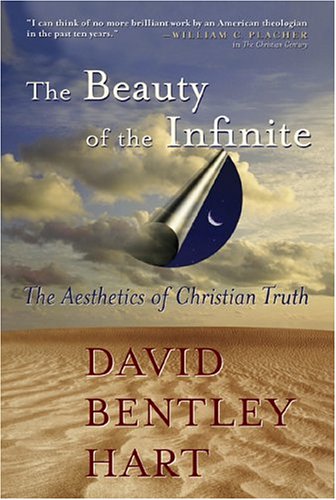 I'm re-reading David B. Hart's Beauty of the Infinite, which I never quite made it through on my first go around. It contains a heavy dosage of philosophical and theological terminology and concepts, as well as obscure (to me) Greek, Latin, German and perhaps Russian terms which Hart doesn't bother translating for the lay person (though the usage often implies the meaning). All of which contributes to making it a difficult -- though often rich and rewarding -- read.
I'm re-reading David B. Hart's Beauty of the Infinite, which I never quite made it through on my first go around. It contains a heavy dosage of philosophical and theological terminology and concepts, as well as obscure (to me) Greek, Latin, German and perhaps Russian terms which Hart doesn't bother translating for the lay person (though the usage often implies the meaning). All of which contributes to making it a difficult -- though often rich and rewarding -- read.This book -- being Hart's proper, academic, theological magnum opus -- doesn't contain the typical tone of most of his more informal essays, which are usually satirical, acerbic, humorous and sometimes venomous. Occasionally, though, that more familiar Hart shines through.
In this excerpt he has just concluded an argument in defense of the analogia entis, or "analogy of being", as given meaning by Erich Przywara in the last century, which Barth in turn rejected and proclaimed that rejection essential to Protestantism.
Rejection of the analogy of being, properly understood, is a denial that creation is an act of grace that really expresses God's love, rather than a moment of alienation or dialectical negation; it is a rejection, that is, of Acts 17:28, and ultimately of Genesis 1:1 (and everything that follows from it). If rejection of the analogia entis were in some sense the very core of Protestant theology, as Barth believed, one would still be obliged to observe that it is also the invention of antichrist, and so would have to be accounted the most compelling reason for not becoming a Protestant.Now there's the Professor Hart I know and love!
No comments:
Post a Comment